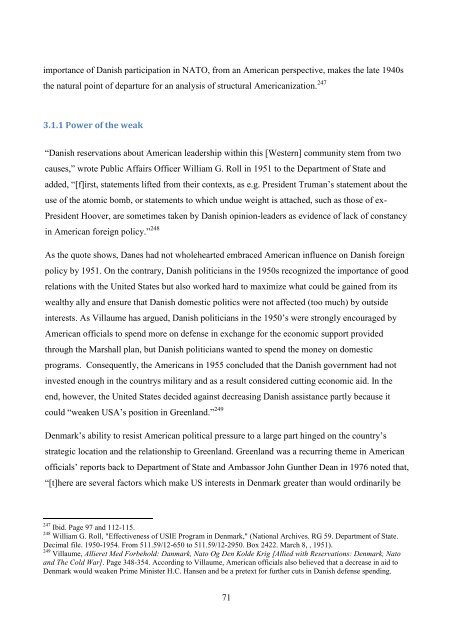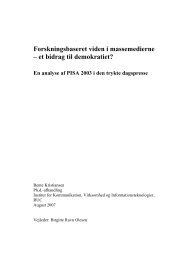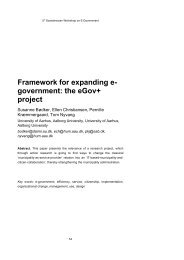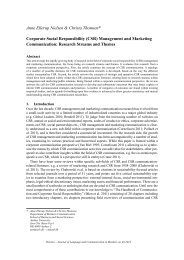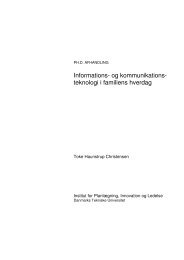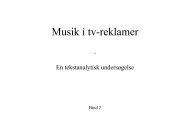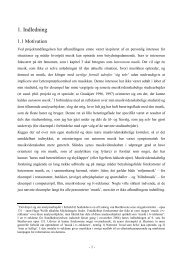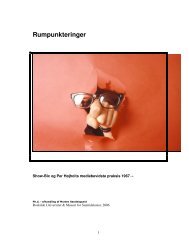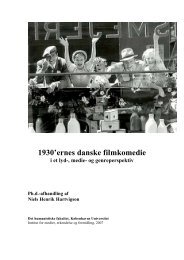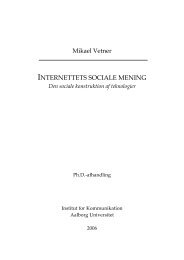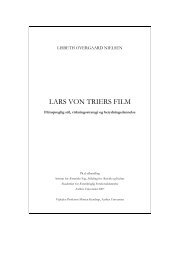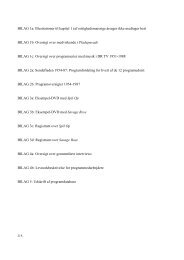The Jeremiad Over Journalism
The Jeremiad Over Journalism
The Jeremiad Over Journalism
You also want an ePaper? Increase the reach of your titles
YUMPU automatically turns print PDFs into web optimized ePapers that Google loves.
importance of Danish participation in NATO, from an American perspective, makes the late 1940s<br />
the natural point of departure for an analysis of structural Americanization. 247<br />
3.1.1 Power of the weak<br />
―Danish reservations about American leadership within this [Western] community stem from two<br />
causes,‖ wrote Public Affairs Officer William G. Roll in 1951 to the Department of State and<br />
added, ―[f]irst, statements lifted from their contexts, as e.g. President Truman‘s statement about the<br />
use of the atomic bomb, or statements to which undue weight is attached, such as those of ex-<br />
President Hoover, are sometimes taken by Danish opinion-leaders as evidence of lack of constancy<br />
in American foreign policy.‖ 248<br />
As the quote shows, Danes had not wholehearted embraced American influence on Danish foreign<br />
policy by 1951. On the contrary, Danish politicians in the 1950s recognized the importance of good<br />
relations with the United States but also worked hard to maximize what could be gained from its<br />
wealthy ally and ensure that Danish domestic politics were not affected (too much) by outside<br />
interests. As Villaume has argued, Danish politicians in the 1950‘s were strongly encouraged by<br />
American officials to spend more on defense in exchange for the economic support provided<br />
through the Marshall plan, but Danish politicians wanted to spend the money on domestic<br />
programs. Consequently, the Americans in 1955 concluded that the Danish government had not<br />
invested enough in the countrys military and as a result considered cutting economic aid. In the<br />
end, however, the United States decided against decreasing Danish assistance partly because it<br />
could ―weaken USA‘s position in Greenland.‖ 249<br />
Denmark‘s ability to resist American political pressure to a large part hinged on the country‘s<br />
strategic location and the relationship to Greenland. Greenland was a recurring theme in American<br />
officials‘ reports back to Department of State and Ambassor John Gunther Dean in 1976 noted that,<br />
―[t]here are several factors which make US interests in Denmark greater than would ordinarily be<br />
247 Ibid. Page 97 and 112-115.<br />
248 William G. Roll, "Effectiveness of USIE Program in Denmark," (National Archives. RG 59. Department of State.<br />
Decimal file. 1950-1954. From 511.59/12-650 to 511.59/12-2950. Box 2422. March 8, , 1951).<br />
249 Villaume, Allieret Med Forbehold: Danmark, Nato Og Den Kolde Krig [Allied with Reservations: Denmark, Nato<br />
and <strong>The</strong> Cold War]. Page 348-354. According to Villaume, American officials also believed that a decrease in aid to<br />
Denmark would weaken Prime Minister H.C. Hansen and be a pretext for further cuts in Danish defense spending.<br />
71


